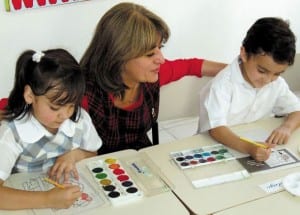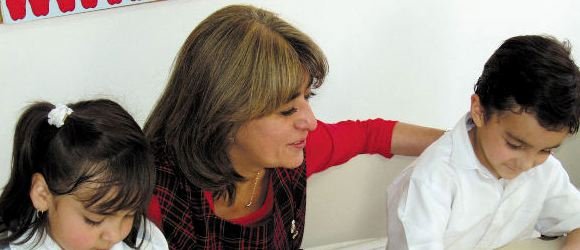Are Teachers At Fault for Plagiarism?
 Whenever I talk with students about plagiarism or listen to them talk about it elsewhere, a common theme comes up. Though students understand reasonably well what plagiarism is and what the consequences are, when asked why they or others do it regardless, many turn their attention to their teachers, professors and other instructors.
Whenever I talk with students about plagiarism or listen to them talk about it elsewhere, a common theme comes up. Though students understand reasonably well what plagiarism is and what the consequences are, when asked why they or others do it regardless, many turn their attention to their teachers, professors and other instructors.
But while it’s easy to dismiss that as blame-shifting, it does raise a question: Is plagiarism really the fault of the teacher?
The short answer is “No” but the full answer is complicated and shows exactly how difficult of a problem plagiarism is. There are many variables that lead students to copying and pasting their assignments and the teachers are just one of them.
Why Students Blame Teachers
Right off the bat, there is a huge problem with blaming teachers for students’ plagiarism. Basically, it’s an attempt to blame one person for another’s actions and that flies against the very concept self determination that our ethics and laws are built upon.
Students are responsible for plagiarism because it is their action and their choice. No one is forcing them to cheat and there are always other options.
That being said, students do raise the same issues as to how teachers may unwitting encourage plagiarism. This includes:
- Assignment Choices: Teachers give bland, uninteresting assignments that are both easy to plagiarize and not engaging to actually complete.
- Workload: Teachers often give too much work that forces students to plagiarize to meet deadlines. This is both within the same class and due to lack of coordination with other instructors.
- Lack of Attention: Many teachers show little interest in the assignments they hand out. Some students even believe teachers don’t read the assignments they get back.
While, obviously, these are not true in all cases, they do highlight some of the problems with how schools are handling plagiarism and some of the mistakes teachers make when dealing with plagiarism.
This attitude has even been supported by academic papers and it highlights the fact that many students feel almost led into plagiarism by an education system that makes it extremely tempting at a time where it is also extremely easy.
But that doesn’t mean teachers are to blame for plagiarism, far from it, even if one dismisses the problem of blaming one person for another’s actions, teachers are just one of many variables that are affecting plagiarism.
Why Teachers Aren’t at Fault
While there a great deal that teachers can and should do to prevent and discourage plagiarism, the problem of plagiarism goes well beyond their control. Consider the following:
- Technology Changes: Technology has changed rapidly in the last 25 years and teaching methods have not been able to keep up. Technology has made plagiarism and cheating many times easier, but not provided as good of tools for detecting and stopping it.
- Systemic Problems: Classrooms that are too large, emphasis on standardized tests, grading systems forced upon teachers and other educational problems paint teachers into a corner, forcing them to be less attentive and craft less-compelling assignments.
- Student Attitudes: Even before students reach the classroom, their attitudes about copying and originality have been changing drastically.
All in all, the teacher is just one piece of the puzzle and a small one at that. But it is true that they can and should do more to prevent plagiarism.
Still, that doesn’t mean they have the power to make it go away.
What Teachers Can Do
We’ve talked a great deal about what teachers can and should do to stop plagiarism and the push for a rational response to plagiarism is growing wildly.
However, the big ideas are fairly simple:
- Educate on Plagiarism: Teach students clearly what it is and how to avoid it. Discuss plagiarism openly and without scare tactics.
- Craft Plagiarism-Resistant Assignments: Use prompts that can’t be Googled, require multiple drafts and include in-class portions when possible.
- Connect With Students: Offer to help and give students the support they need so they are confident they can complete the assignment.
- Forgive Mistakes: Understand that mistakes happen and treat them as chances to teach, not discipline.
- Discipline Fairly: Those who clearly are trying to cheat should be disciplined fairly and strongly as appropriate.
However, if teachers did this perfectly (in spite of systemic issues that may prevent it) would plagiarism cease to exist? Absolutely not. It would be mitigated and made less of a problem, but it would still be an issue.
In short, even if teachers were perfect, which is humanly impossible, plagiarism would still be a very real and very potent issue for academia.
Bottom Line
Blaming teachers for plagiarism is outrageous. While there is more that teachers can and should do. Blaming them isn’t the approach.
If you want proof of how rough it is for teachers, read the story of the NYU professor who caught 20% of his class cheating and was rewarded by the smallest pay raise he had ever gotten, based largely on student evaluations.
Teachers, when it comes to plagiarism, are just a piece of the puzzle. The causes of plagiarism are simply too complicated and too put the blame on any one thing. Even then, there are much more fitting targets than teachers.
Want to Reuse or Republish this Content?
If you want to feature this article in your site, classroom or elsewhere, just let us know! We usually grant permission within 24 hours.
